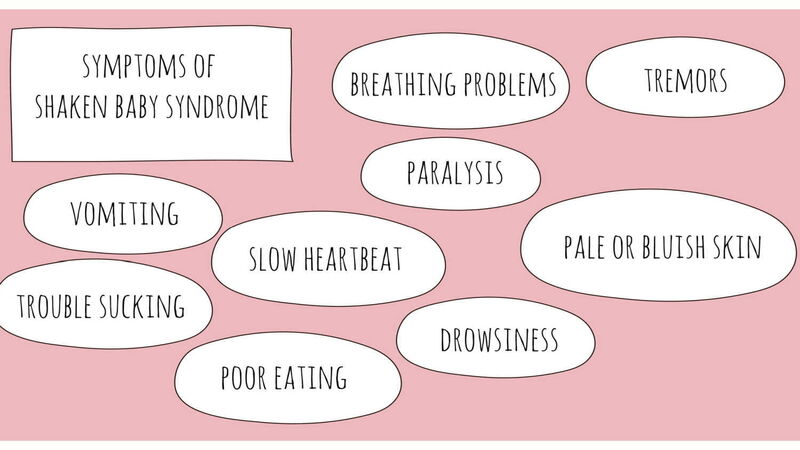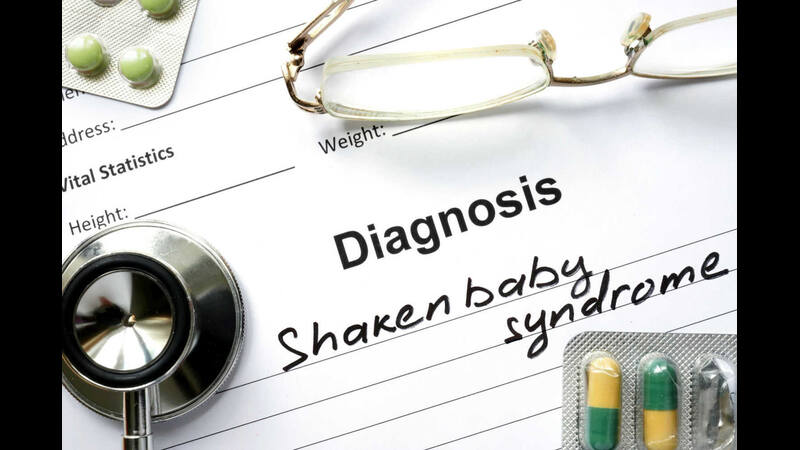
As your baby opens its eyes to this world, there are a large number of things that need to be taken care of to avoid any kind of problem. Especially, nowadays, as both of the parents are working and limited support from the family, parents are forced to entrust their baby in the hands of a maid. Do you know a fact that nowadays toddlers are subjected to different kinds of abuse in their own homes? You might have seen various videos that went viral on social media which prove how cruelly some caretakers “console” an unhappy baby. This kind of child abuse can have a permanent effect on the baby’s physical and mental health. Shaken baby syndrome is a common condition where parents or caregivers may unwittingly cause harm to the baby.
If you are hearing this term for the first time, shaken baby syndrome is the damage to the parts of the brain and nervous system due to vigorous shaking of the baby. It is vital to be aware of the symptoms and signals so that you can get medical attention for your baby at the earliest.
What Is Shaken Baby Syndrome?
Shaken Baby Syndrome refers to a severe brain injury that is caused due to forcefully shaking an infant or a toddler. (1a) It is an abusive head syndrome that damages the brain cells and decreases the amount of oxygen to enters the brain. A head injury can result in permanent brain trauma or even death. Furthermore, vigorous shaking of an infant or small child (particularly preterm babies) can cause other injuries, such as neck, spine, and eye damage.
Are All Infants at Risk of Shaken Baby Syndrome?
This syndrome is commonly seen in babies below two years of age. On an average scale, this disease mostly occurs in children between 3 and 8 months of age. The most common causes of this trauma in children are domestic violence in the home or adverse stressors that cause the parents to act violently.
Causes of Shaken Baby Syndrome

Given below are some of the major causes of shaken baby syndrome, which can damage the functioning of the nervous system and make him irritated and nauseous:
- Violently shaking a baby or toddler and directing all of one’s anger and frustration at them. (2a)
- Vigorous shaking causes the brain to bounce back and forth against the skull. This will increase the chances of internal bleeding as the large veins that go through the outer surface of the brain are more likely to tear by means of these vigorous movements.
- Infants with weak muscles and bones are more prone to this syndrome, as they struggle to support their heads.
- Similarly, babies with a big head and delicate blood vessels are more prone to this condition.
- Babies might have to suffer from internal bleeding, bruising, and swelling of the brain leading to memory loss or unconscious mind, permanent brain damage, or even death.
What Does Not Cause A Shaken Baby Syndrome?
Shaken baby syndrome is known to be brought on by violent head shaking, which damages the baby’s brain’s blood vessels.
Thus, the following acts do not cause this syndrome:
- Tossing your baby.
- You are running quickly with the baby in your arms.
- You are vaccinating the baby.
- If the baby falls from low heights.
- You are swaying your baby in your arms.
- Driving with the baby on bumpy roads.
- Bouncing baby on the legs.
Symptoms of Shaken Baby Syndrome

Symptoms of Shaken baby syndrome vary with different factors like the baby’s age, frequency and duration of the abuse, etc. It is important to note that in a mild case of the condition, symptoms may not appear immediately. However, eventually, many of the following symptoms arise.
Now let’s have a look at some of the signs and symptoms of shaken baby syndrome: (1c)
- Difficulty staying awake
- Dilated pupils that do not respond to light
- Vomiting
- Breathing problems and irregularities
- Drowsiness accompanied by irritability
- Pale skin
- Posture in which the head is bent back and the back arched
- Coma
- Decreased appetite
- Paralysis
- Altered level of consciousness
- Cardiac arrest
- Convulsions or seizures
Diagnosing Shaken Baby Syndrome

Some of the minor indicators of this disease are variations in the behavior and feeding patterns of the baby. Aside from that, lethargy, seizures, fuzziness, inflammation, headache, and bleeding are some other symptoms that a doctor can easily detect. (2b)
Following are the three most popular tools that are used to identify the in-depth damage to the baby’s brain:
- Computed Tomography Scan
- X-rays
- Magnetic Resonance Imaging
Keep an eye on the reports and immediately discontinue any activities that are suspected of causing this condition in babies. In addition, take the prescription drugs as directed by the doctor and begin taking them immediately!
Long-Term Effects of Shaken Baby Syndrome
Shaken baby syndrome can take a severe turn. It can take the child to a coma stage or even death. Even the children who survive this issue may contract lifelong issues that affect their vision and brain development. Here are some of the long-term effects of this condition. (1d)
- Seizures
- Blind or severe issues related to vision
- Behavioral issues
- Intellectual disabilities
- Spasticity (muscle stiffness)
Is Shaken Baby Syndrome Treatable?

Unfortunately, it is very difficult and rare to treat shaken baby syndrome completely. A baby even shaken briefly can suffer from irreversible brain damage. Despite emergency care, babies who survive shaken baby syndrome may require lifelong care for the damages or conditions caused.
As the baby grows, treatment or support can help with vision issues (4a), behavioral issues, or intellectual disabilities caused by shaken baby syndrome. It is even possible for the baby to live a close-to-normal life with the right support, but lifelong support is a necessity in the majority of cases.
How Long Does Shaken Baby Syndrome Last?
Shaken baby syndrome can last lifelong. In severe cases, the baby may not even survive. (1b) Sorry to scare you but that’s how serious this issue is!
In case of internal bleeding or bleeding in the brain, emergency treatment or surgery can help arrest or stop the bleeding. However, the damage caused due to the internal bleeding cannot be reversed completely. The level of impact varies from case to case as it depends on various factors including how bad the shake was, how severe the impact was, how quick and effective the treatment was, etc. (2c)
How To Prevent Shaken Baby Syndrome?

In most cases, shaken baby syndrome is due to aggressive handling of the baby, which is completely preventable. Here are some effective ways to prevent it:
- The best way to prevent shaken baby syndrome is to NOT SHAKE your baby vigorously. No matter how much they love the movement or how irritated you are with the baby, refrain from rough handling.
- Ensure your infant has sufficient neck and head support whenever you carry them. Infants are very easy to carry in one hand while doing some work around the house. Refrain from doing that as much as possible, and when you do it, hold the baby’s head firmly.
- When traveling in a vehicle on bad roads, it is natural for the baby’s head to shake. This is safe, but too much shaking or head-banging is not. Use a good car seat with sufficient head support. In India, car seats are not compulsory, and it is common for parents to carry the baby in their lap or lay them on the seat. Ensure their heads don’t shake around too much.
- If you are irritated with a baby who just won’t stop crying, ask for help. If you have no help around, try some calming techniques like taking deep breaths, pacing the room until you feel less agitated, or turning on some music. (3a)
We all know how difficult it can be with a newborn who just won’t stop crying, won’t sleep through the night, or will not breastfeed no matter what you try. Trust us, these issues are much smaller than the complications that can arise from shaking the baby. Every time you feel like shaking your baby out of rage, just remember the consequences and think of alternate methods to handle the baby.
FAQ’s
1. Can Bouncing a Baby Cause Shaken Baby Syndrome?
No, bouncing a baby does not cause shaken baby syndrome as long as you are being gentle with the baby and providing enough head and neck support. Rigorously bouncing the baby should be avoided at all times.
2. At What Age Does Shaken Baby Syndrome Stop?
Shaken baby syndrome will not usually be seen in babies older than 2 years of age, but parents should always be careful and watchful to ensure that babies and older children do not face any kind of situation that may lead to shaken baby syndrome
3. Can Jerking a Baby Cause Shaken Baby Syndrome?
Yes, vigorous jerking of the baby in your arms, or bouncing them too fast on your legs can cause their brain to shake, resulting in shaken baby syndrome.
4. Can a Baby Recover From Shaken Baby Syndrome?
No. A baby cannot recover completely from shaken baby syndrome. Emergency treatments and surgery can help control internal bleeding or brain bleeding but cannot reverse the damage caused.
Reference
- National Institute Of Neurological Disorders And Stroke – https://www.ninds.nih.gov/health-information/disorders/shaken-baby-syndrome#
- Wikipedia, Shaken baby syndrome – https://en.wikipedia.org/wiki/Shaken_baby_syndrome#
- University Of Rochester Medical Center – https://www.urmc.rochester.edu/encyclopedia/content.aspx?contenttypeid=1&contentid=1103#
- American Academy of Ophthalmology – https://www.aao.org/education/clinical-statement/abusive-head-traumashaken-baby-syndrome#:
